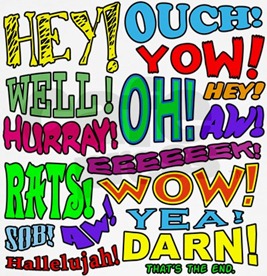Rebels without a (Grammatical) Cause
Interjections are fun words often used as an expression of emotion or an interruption. Interjections act like grammar rebels; loitering with no syntactical connection with the rest of the sentence they are used in, usually appearing parenthetically or separated by commas from the rest of the sentence. True to their lone wolf persona, interjections are quite effective on their own without a gang of words to help them make their point, they are able to form a complete sentence on their own by expressing a thought without the need for a subject and verb—who needs ‘em anyway? When an interjection stands alone in this manner, it is often called an exclamation, especially when it’s used emphatically.
While interjections can sometimes seem unsure, shuffling their feet while uttering “er” and “um” amongst the other words; they can be very impatient when made to wait showing their annoyance with a well-placed “humph”, “ugh”, or “argh”. It is also important to be weary of exclamations; they are loose-cannons prone to mood swings ranging from one extreme (often shouting “Yay!” and “Hooray!”) to another (suddenly crying out “Drat!”, “Dang!”, “Rats!” or even in some situations, “F*ck!”). You needn’t worry too much though; they can be nice when you get to know them. Once on friendly terms, they may start issuing pats on the back with their greetings: “Hi!” Or their praise: “Attaboy!”
You may be wondering how I know all this. Well, the truth is, I once knew an interjection who was enamored with me. One day it kissed me suddenly, but I was so surprised all I heard was “muah” and then my own embarrassed “Gee whiz!” Don’t spread that story around though, I don’t want to get a reputation with the other parts of speech for being an article* that gets passed around from noun to noun.
 Humorous personification aside, interjections are a very important part of speech. They allow people to convey complex emotions with minimal effort and, as such, they are a must-know when learning a new language. Have you ever heard a language teacher say to you, “you need to think in (target language), not just speak in it”? When you intuitively start using the appropriate interjections in a language, you are effectively thinking in that language.
Humorous personification aside, interjections are a very important part of speech. They allow people to convey complex emotions with minimal effort and, as such, they are a must-know when learning a new language. Have you ever heard a language teacher say to you, “you need to think in (target language), not just speak in it”? When you intuitively start using the appropriate interjections in a language, you are effectively thinking in that language.
Consider this scenario: you are having a conversation in Spanish (or whatever language you are learning), when someone suddenly runs up and kicks you in the shin. At what point do you think you’ve mastered fluency of the language?
“Si me gusta la– ouch!”
Or
“Si me gusta la–ay!”
It doesn’t make sense to start a sentence in one language then suddenly express pain in another. You need to keep the wheels moving in one direction, so to speak. So get out there and start injecting your language practice with interjections.
What do you think of interjections, are they brooding loners or misunderstood words trying to find a safe place to express their emotions?
*Ha! Get it? I meant “article” to mean “object”, but an article is also a part of speech that accompanies nouns. I know it’s a lame pun, but I laughed really hard when I thought of it.

